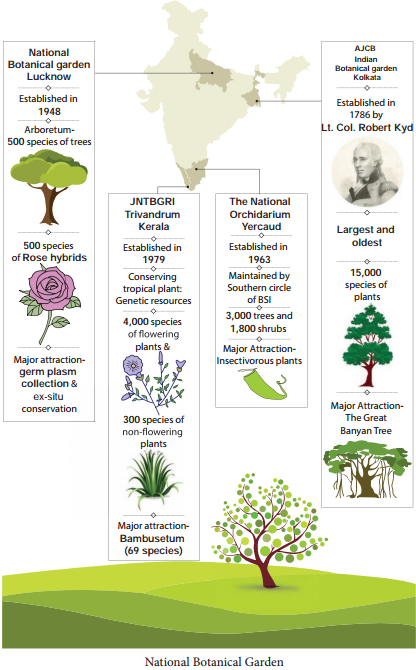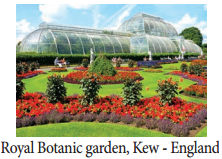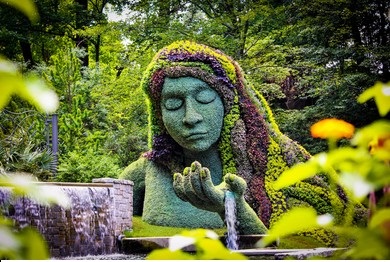Learninsta presents the core concepts of Biology with high-quality research papers and topical review articles.
Botanical Gardens and its Significance
In true sense all gardens are not botanical gardens. Botanical gardens are centres for collection of plants in their various stages of living. Gardens existed for growing ornamental plants for aesthetic value, religious and status reasons. The famous “hanging gardens” of Babylon in Mesopotamia is an example. For the purpose of science and education the first garden was maintained by Theophrastus in his public lecture hall at Athens.
First modern botanical garden was established by Luca Ghini (1490-1556) a professor of Botany at Pisa, Italy in 1544. Botanical garden contains special plant collections such as cacti, succulent, green house, shade house, tropical, alpine and exotic plants. Worldwide there are about 1800 botanical gardens and arboreta.
Role of Botanical Garden:
Botanical Gardens play the following important roles.
- Gardens with aesthetic value which attract a large number of visitors. For example, the Great Banyan Tree (Ficus benghalensis) in the Indian Botanical Garden at Kolkata.
- Gardens have a wide range of species and supply taxonomic material for botanical research.
- Garden is used for self-instruction or demonstration purposes.
- It can integrate information of diverse fields like Anatomy, Embryology, Phytochemistry, Cytology, Physiology and Ecology.
- Act as a conservation centre for diversity, rare and endangered species.
- It offers annual list of available species and a free exchange of seeds.
- Botanical garden gives information about method of propagation, sale of plant material to the general public.

Royal Botanic garden, Kew- England

Royal Botanic garden Kew – England is a non – departmental public body in the United Kingdom. It is the largest botanical garden in the world, established in 1760, but officially opened in the year 1841. Plant collections include Aquatic garden, Arboretum with 14,000 trees, Bonsai collection, Cacti collection and Carnivorous plant collection.
Botanical garden, also called botanic garden, originally, a collection of living plants designed chiefly to illustrate relationships within plant groups. A display garden that concentrates on woody plants (shrubs and trees) is often referred to as an arboretum.
How do I get official Botanical Garden status? The garden is open to the public on at least a part-time basis. The garden functions as an aesthetic display, educational display and/or site research. The garden maintains plant records.
Royal Botanic Gardens in Kew, England – known as the largest botanical garden in the world, this 300-acre garden near London is home to the world’s biggest collection of living plants.
Botanical gardens devote their resources to the study and conservation of plants, as well as making the world’s plant species diversity known to the public. These gardens also play a central role in meeting human needs and providing well-being.
These are specialised gargens which have collections of living plants for reference plant species in botanical gardens are grown for identification purposes and each plant is labelled by indicating its botanical name and family. e.g: 1. Kew (England).
Advantages. Botanical gardens devote their resources to the study and conservation of plants, as well as making the world’s plant species diversity known to the public. These gardens also play a central role in meeting human needs and providing well-being.
Botanical gardens make money based on their purpose. For example, a botanical garden may have a contract with a university or company to produce research on new plant species. If the space is being used largely for the public, patrons will pay an admission fee to tour the garden.
For the adjective meaning of or relating to botany or the cultivation of plants, botanic and botanical are both acceptable, and there is no difference between them. Botanical is more common, however, especially in modern.
Botanical is more common, however, especially in modern English. Firstly, botanical gardens can provide the new plants of economic importance to society, including ornamentals, medicinal, trees for reforestation, plants for industry, fruits, and cash crops. Next, some plants are collected for the study of adaptability, growth, and also the economic and genetic characteristics.
